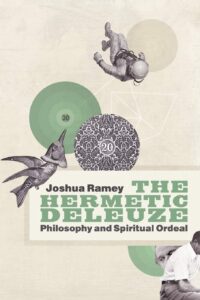Lecture by Joshua Ramey, the author of “The Hermetic Deleuze: Philosophy and Spiritual Ordeal” (Duke University Press, 2012)
27 June 2014, 14:00
Allard Pierson Museum Amsterdam, Nina van Leerzaal, Oude Turfmarkt 127
Abstract:
In his 1968 work of experimental metaphysics, Difference and Repetition, Gilles Deleuze articulated a theory of ideas, and a related theory of thought, that links both ideas and thought to a peculiar conception of spatiality. Deleuze insists on a specificallyintensive space coordinated with and in some sense identical to ideas, and further argues for a conception of thought as linked to the contours of such intensive space. This strange, virtual materiality of the traditionally “spiritual” space of ideas is one of the most difficult and obscure aspects of Deleuze’s thought. InDifference and Repetition, to articulate this spatiality of ideas Deleuze constantly references the work of certain literary avatars of the early avant-garde—especially Proust, Joyce, and Antonin Artaud. These authors who experiment by breaking with habitual modes of sense and order in order to repotentiate the body and thought. But, as I will argue in this presentation, equally important for comprehending the intensive space of such repotentiation are a series of painters including Max Weber, Kandinsky, Klee, and Francis Bacon, all of whom were obsessed (explicitly or implicitly) with what Linda Dalrymple Henderson has identified as a peculiar intensive spatiality grounded in late 19th and early 20th century developments in geometry and physics. Drawing on Henderson’s The Fourth Dimension and Non-Euclidean Geometry in Modern Art, I argue that Deleuze’s identification of a certain mode of thought in artistic experimentation, “transcendental empiricism,” has to do precisely with aesthetic exploration of the spatial fourth dimension, and with the spiritual potential of such a dimension for the transformation of sensory, cognitive, and affective capacities. Read in this way, the theory of ideas in Difference and Repetition is more clearly connected to Deleuze’s later work with Guattari, where Deleuze becomes much more explicit about the necessity for thought of practices of “becoming” that have clear roots not only in literary and painterly experimentation, but in psychedelic, ascetic, meditational, and yogic practices across a variety of esoteric metaphysical traditions.

Joshua Ramey is the author of The Hermetic Deleuze: Philosophy and Spiritual Ordeal (Duke University Press, 2012). His research is focused on the persistence of esoteric metaphysical traditions in contemporary late capitalist culture, and on the implications of such persistence for debates in political theology and political economy. He is current book project is Politics of Divination: Neoliberal Endgame and the Religion of Contingency (forthcoming, Palgrave-Macmillan Press). He is Assistant Professor of Philosophy at Grinnell College (USA).


